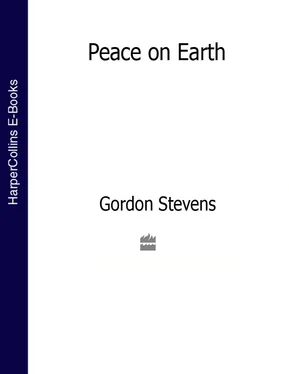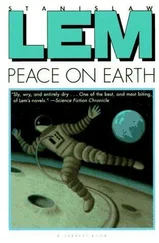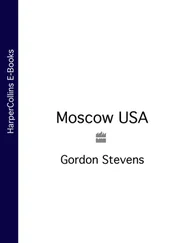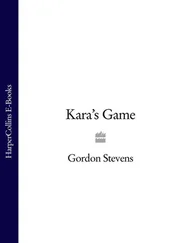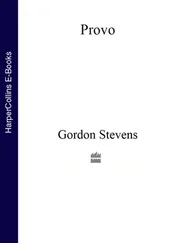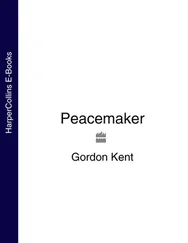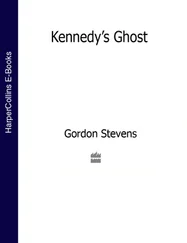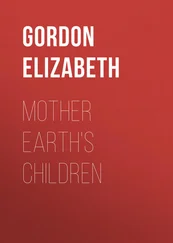The café to which he led his shadows was in a maze of alleyways and passages in a quarter of the city they did not normally frequent, the entrance almost hidden behind a street hoarding. They left the car and completed the last fifteen minutes on foot, not knowing where he was going or why he was going there.
The room in which they finally settled seemed smaller than it was, the air filled with smoke, the floor packed with tables surrounded by men, mainly old, drinking arak and playing tawli. Nabil settled himself against a side wall, almost lost in the semi-gloom of the room, as if it was the place he always sat, while a waiter in a dirty white shirt and floppy grey trousers brought them their drinks. They took them, no one seeming to notice the newcomer or the two men who sat at either shoulder, no one seeming to notice the weapons which hung beneath their loose-fitting coats.
Nabil sat for half an hour before he chose his man, then he ordered more drinks, rose from his seat, leaving his escorts against the wall, and made his way to the table he had selected, ignoring both the game in the middle of the room, where the shouts seemed the loudest, and the one in the corner which attracted the most spectators, easing his way through to the inner circle of men so quietly and inconspicuously that they did not even register his presence.
The two men at the table had skin like parchment; they sat facing each other, rolling the dice from a worn leather cup, counting their moves, checking each other’s moves. The game lasted another fifteen minutes, then the players began stacking the pieces in the wooden boxes at the side of the board, one of them finishing his drink and the other looking up at Nabil.
‘You would like a game, I think.’
Nabil knew he had chosen wisely. ‘I would like a game,’ he confirmed.
It was the beginning of the new day.
They played for thirteen minutes under the hour; when they finished it was not clear whether the old man had won or been allowed to win. The crowd began melting away till they were alone at the table.
‘One question, old man,’ Nabil asked politely, respectfully.
The old man knew it was why the stranger had come, why he had played him. ‘One answer,’ he agreed.
From the wall at the back of the café, the shadows watched intently.
‘We have just played,’ said Nabil, ‘and you have just won.’ His voice was quiet, yet the old man did not have to lean forward to hear the words. ‘If someone told you that you have just won and I have just lost, what would you say?’
The old man’s eyes shone with a sudden pleasure. In the night outside, he knew, something was stirring, beginning, did not know what, had no way of knowing, knew that most people would say he would never know. Knew, in his wisdom and his years, that one day he would.
‘My father,’ he began, ‘was a good man, a wise man. He was also an Arab. If a man took him outside at night and showed him the moon, then took him outside the next morning and showed him the sun, he would wonder why the man was telling him that the moon rose at night and the sun shone during the day.’ He saw that the stranger was nodding his understanding and reached for his drink. The glass was empty; Nabil slid his own across the table. The old man took it and sipped from it, then placed it between them.
‘Compared with your question,’ he went on, his voice faint with age, ‘such matters are simple.’ He looked down at the tawli board. ‘If you ask me whether I have just beaten you. I would answer no. I would answer that you have just beaten me .’
‘Even though everyone would tell you that you have just won?’
The old man’s eyes shone again. ‘Especially if everyone tells me I have just won.’
‘Why?’ asked Nabil. He was so close to the truth that only he would understand, that only he could know.
The old man fingered the tawli pieces.
‘With you,’ he said, ‘nothing is as it seems. If the world tells a man he has won and you have lost, then he has lost and you have won.’
‘Why?’
‘Because you are more than an Arab,’ replied the old man, ‘you are a Palestinian.’
‘Thank you.’ Nabil rose to leave. At the wall at the back, the old man saw the two men with the loose-fitting coats rise to follow.
‘I only told you what you already knew,’ he said.
Nabil thought of the article in the newspaper, the plan that had been born of it, the single factor that would decide whether or not the plan would succeed. ‘That is why I thank you.’
* * *
Abu Nabil was fifty-three years old; his father had been a merchant, his two brothers were still prosperous businessmen on the West Bank, he himself had qualified as a doctor. For the past thirty years, however, his profession had been the exercise of whatever means he considered necessary to secure the return of his people to the land called Palestine. Others referred to the craft he practised as terrorism.
He had played a role, at first political, later military, both in the main body of the PLO and, increasingly, in the factions which splintered from it, till he himself headed one of the so-called extremist groups which opposed what it saw as Yasser Arafat’s increasing and self-imposed impotence. He had been involved in most of the acts of terrorism from the late sixties through to the mid eighties, from Dawsons Field and Black September, to the Vienna OPEC hijack, to Mogadishu. More recently he had been at the centre of the power struggle within the ranks of the Palestinian movement itself, his organisation being held responsible for at least some of the assassinations which had spread from the Middle East across Europe. He had operated his forces in the Lebanon during the various stages of that country’s civil war, and had played a key role in forcing the exodus of Yasser Arafat and his mainstream PLO grouping from their headquarters in the Northern Lebanese port of Tripoli in 1983.
The available information on him, however, was less than skeletal, the merest details of his birth and education, of his marriage and of the death of his family, though this was rarely mentioned, especially by his enemies, who feared how even the barest details of the massacre of such innocents would feed the legend which had grown around him.
His name, Abu Nabil, was itself a nom de guerre. There were even those who questioned whether he, in fact, existed, whether he was the person his enemies, and his friends, thought him to be, or whether he was a committee who used his name, his reputation, to further their various causes. Others accepted that he had existed, but maintained that he had died some years previously, probably in an Israeli rocket attack on a house in which he had reputedly been staying. In the past eight years there had been four reports, all reliable, that he had died of cancer, two of them stating that he had died despite treatment in Moscow, and three more reports, equally reliable, that he had died of a heart attack.
* * *
By eight that morning Nabil had slept for a little over three hours, showered and taken a light breakfast, then had gone again through the elements of the plan that was now taking firmer shape in his mind. Precisely on the hour, the first of his appointments arrived.
Malik Saad looked the accountant that he was, small, a sharp nose, heavy-rimmed spectacles. He had headed the organisation’s finances, welcoming its income and quarrelling over its expenditure, for the past five years; during that time he had also invested its money wisely, ensuring a fruitful return both in terms of finance and obligations, spreading its resources not only through the multitude of Palestinian companies which played a major role in the engineering and construction industries of the Middle East, but also into Europe and North America, both the United States and Canada. For the four years before that he had been imprisoned for his part in a bomb attack on an Israeli patrol on the West Bank.
Читать дальше
